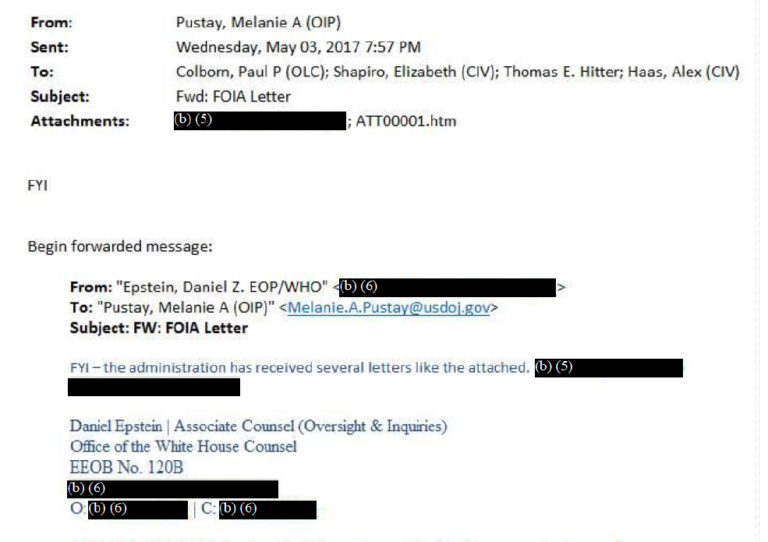In July 2017, Cause of Action Institute (“CoA Institute”) sued the Department of Justice (“DOJ”) after the agency refused to produce records under the Freedom of Information Act (“FOIA”) that would have revealed whether the Office of Information Policy (“OIP”) or Office of Legislative Affairs (“OLA”) were involved in implementing a controversial directive from the U.S. House of Representatives Committee on Financial Services. CoA Institute’s FOIA request, which was filed in May 2017, followed reports that Jeb Hensarling, Chairman of the Financial Services Committee, directed twelve agencies—including, the Department of the Treasury and eleven other entities—to treat all records exchanged with the Committee as “congressional records” not subject to the FOIA.
As a result of litigation, DOJ identified sixteen pages of responsive records. Eleven pages, which represent communications between an “unidentified Executive Branch agency” and DOJ, were withheld in full. One additional record—an email between the Office of the White House Counsel and OIP—was partially redacted, but an attachment—a copy of Chairman Hensarling’s letter—was withheld in full. DOJ defended its treatment of these records by invoking the attorney-client and deliberative process privileges.
Last Friday, CoA Institute moved for summary judgment, rebutting DOJ’s claims and arguing that the agency could not use the attorney-client and deliberative process privileges. With respect to the White House email and attachment, DOJ failed to establish that an attorney-client relationship existed between the White House Counsel and OIP. Assuming the requisite relationship did exist, the email still neither revealed private confidences nor solicited legal advice. It also did not reflect a deliberative or consultative process. Instead, the email was a literal “FYI”—the sort of informational notice that courts regularly compel agencies to disclose:
DOJ also wrongly withheld the email attachment—a copy of Chairman Hensarling’s letter—because the letter is already in the public domain and, in any case, does not reveal confidential information pertaining to the White House or DOJ.
Communications with the “unidentified Executive Branch agency” similarly cannot be exempt under the attorney-client and deliberative process privileges. Although these records may contain legal advice on responding to Chairman Hensarling’s directive, they were shared outside of the Office of Legal Counsel, which is the DOJ component responsible for providing legal opinions to the White House and the rest of the Executive Branch. To maintain attorney-client confidentiality, an agency must not circulate privileged material beyond those officials tasked with providing (or receiving) legal counsel. Here, by involving OLA, which functions as DOJ’s congressional affairs office and does not serve as an “attorney” to other agencies, the “unidentified” agency waived any expectation of confidentiality. Finally, DOJ misused the deliberative process privilege because it failed to explain how these inter-agency communications reflected DOJ’s recommendations or opinions or were otherwise non-factual.
Importantly, DOJ also failed to meet its burden under the new “foreseeable harm” standard. Congress introduced this standard with the FOIA Improvement Act of 2016 to codify the so-called “presumption of openness,” which discouraged the mere “technical” application of exemptions. The FOIA, as amended, now requires an agency, such as DOJ, to explain how specific records can reasonably be foreseen to harm agency interests. DOJ failed to provide a satisfactory argument in this case and did not even mention its obligations under the new standard.
* * *
The public deserves to know how, and to what extent, DOJ was involved in formulating and implementing Chairman Hensarling’s anti-transparency policy. Because Congress is not itself subject to the FOIA, a request for records that have been exchanged with the legislative branch presents unique difficulties. Nevertheless, the law requires that Congress manifest a clear intent to maintain control over specific records to keep them out of reach of public disclosure. As I have argued previously, Chairman Hensarling’s directive is ineffective in this respect. The mere fact that an agency possesses a record that relates to Congress, was created by Congress, or was transmitted to Congress, does not, by itself, render it a “congressional record.” Any deviation from this acknowledged standard for defining a “congressional record” would frustrate the FOIA and impede transparent government.
The real-world implications of these sorts of congressional anti-transparency efforts are hardly imaginary or speculative. The House Financial Services Committee has already intervened in a FOIA lawsuit to enforce its directive. (That lawsuit is still ongoing.) And CoA Institute is involved with a lawsuit against the Internal Revenue Service that involves a similarly overbroad effort by the Joint Committee on Taxation to sweep a range of agency records outside the scope of the FOIA. CoA Institute has twice joined with other good government groups to express concern over these developments (here and here). We are hopeful that the courts will put a stop to Congress’s games, and ensure public access to vital records revealing the interaction of the administrative state with the federal legislature.
CoA Institute’s brief is available here.
Ryan Mulvey is Counsel at Cause of Action Institute

